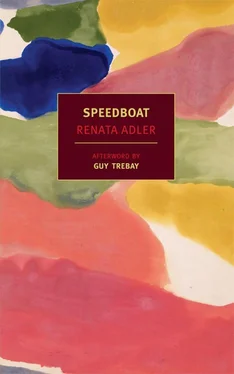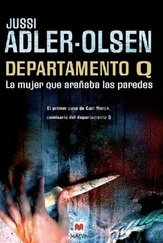Travelers by jet, like subway commuters, tend to arrive on board at the exact last minute. Intercity bus riders take their seats with lots of time to spare. I was the last, in fact the only, passenger on a special late-night bus from Miami to Key Biscayne. “Sister, be calm,” the driver said, as he drove through the darkness. “Jesus is up front here, with me.” One of those, I thought. The ride from Miami Beach to Key Biscayne has a drawbridge in it. The ride is long. “Are you nervous?” the driver went on. “You must be from New York.” I said nothing. He said, “Yes.” I said, “Yes.” A long silence. He repeated, “Yes.” He suddenly turned in his seat and offered me a battered red book. “Turn to page 324,” he said. There seemed no reason not to. I took the book and turned to page 324. “Read it aloud,” he said. What the hell, I thought. It wasn’t dark. I read aloud, what might have been a hymn. When the driver said the first few lines along with me, I thought it was because he knew them by heart. But it was clear he was dissatisfied; I was doing something wrong. I started reading lines, and pausing. He would say the next lines, in the pauses. It turned out that we were meant to read responsively. We did that page. I gave him back his book. “Yes,” he said. “Yes. I have a glorious future. In this life or in the next, it doesn’t matter.” Pause. “Yes.” He asked why I didn’t go to church, or read the Bible, or learn to untamp the spiritual power. “Do you pray?” he asked. I said, sometimes. We drove a long time. “I pray twenty-four hours a day,” he said. When we had driven quite a lot further, he said, “Yes.” Then his voice fell. “Something tells me,” he said, “that we have missed our exit.” He turned the bus, crossed the divider and found the way.
“I’ve been doing tunes. I’ve been doing melodies. I’ve gone back to it,” the kind composer said. “After doing atonal music for twenty years.” I asked him what the equivalent of staleness to the point of witlessness in his field was, or whether, in music, such a thing exists. “Oh, yes,” he said. “Pitch fatigue.”
THE BOAT was old. The food was boiled. The berths were not sound. The passage took more than a week. The class in all cabins, on all decks, was tourist class. On the ninth day out of New York, the night before Cobh, there was, near the engine room, a talent show. A girl from Briarcliff tap-danced to a hymn. Three boys from Tufts played “Aloha-Oe” with forks on water glasses filled to various heights. A couple, returning to Bavaria after twenty years, sang “Du, du liegst mir am Herzen” seven times. A clerk from Albany did imitations, turning his back to the audience to compose his face before each one. A Scoutmaster from Tenafly rode his unicycle around the floor. The Bavarian couple’s daughter, having been at first reluctant to perform, sang an operatic German favorite, which translated, turned out to be “Fritz, Rejoice! Fritz, Rejoice! Tomorrow We Are Having Celery Salad.” And then an Indian student from McGill, who had boarded the ship at Montreal, slowly, deliberately wound a turban around his head. That was it. He did not win the prize — a pastoral scene in marzipan — but he gave one to think what talent is. Such an interesting conception of it did not come my way again until, years later, in a trench in the Sinai, an Israeli soldier, born in Yemen, chewed up and swallowed a razor blade to impress Yael Dayan.
That year, a Fulbright to Paris had somehow found his way to a band of street fighters in Budapest. A Florence Fulbright had died with a party of tourists he had been leading through the desert in Libya. The Americans were not staying put. Students on grants abroad lost permission to receive their checks by mail. Showing up to be paid kept them, once a month at least, in place. Back home, a group of students, driving a car across the country for its owner, whom they did not know (an agency made the transaction), sped for hours through the desert. It was nearly sundown. They had seen no other cars since noon. Then, in the distance, with the setting red sun just behind it, they saw a car, at the world’s edge, coming toward them. They laughed and kept driving. For several minutes, the two cars raced in their lanes toward each other. Drivers and passengers began to smile and wave across the desert. A few more seconds — laughing, shouting, waving — the two cars collided. There were twelve occupants in all, and none were dead when it was over. A seventeen-year-old boy regained consciousness in the air, caught and sustained by telephone wires. He was too startled to be scared. He climbed down the telephone pole rungs calmly. His arm was slightly broken. The others, only bruised, were scattered along several yards of highway. They picked themselves up gradually, looked at what remained of the two cars, shuddered, and sat down together.
The arthritic Chihuahua, with cast, glazed eyes, walked among the plates and glasses on the tablecloth. We were in a restaurant near the Banque de France. Madame Devereux was telling her experiences of the war. She had rolled bandages. She had suffered privations, inconveniences. She had endured reports of the conditions at the front. At first, word of the ghettos in Eastern Europe had caught her sympathies. But then she was appalled. They, she was told on high authority, had stolen all the doorknobs off the ghetto doors, and sold the knobs. They were such salesmen; she had been naïve. But when, as Monsieur Devereux had known they would, they turned around and sold the bandages, Madame could roll no more. She caught our eyes. “ N’est-ce pas, mon petit, ” she said, stroking a tufted bald spot behind her Chihuahua’s ear. He wheezed and stretched. A wineglass overturned. “ N’est-ce pas, mon petit, qu’ils allaient trop loin. ” It was not one of us who overturned the glass. It was the dog. We were trying so hard. Maybe it was our French we were uncertain of.
We had lined up. We had crossed the Atlantic on a small, old boat of the French line called the Flandre, which we called the Flounder — partly for the joke but mainly to avoid in each other’s presence that attempt to pronounce the French r, which seemed of such importance to us then. We had lined up for the carte de séjour and the identity card, for student accreditation and for the certificate of equivalence to our American degrees. Having stood in one line long enough to reach the bureaucrat whose job it was to issue one document, we learned that the prerequisite for it was another. At the end of the line for this other, we learned from its bureaucrat that he could not issue his document without evidence that we had already obtained the first, or a third, perhaps others or both. It was the fall of 1961. French students — and, for all we knew, students of every other nationality — were already burning American flags in the Sorbonne courtyard, on behalf, they said, of Cuba. It was clear they hated us. We stood. We smiled. We had gone abroad with the American smile. We were very serious. Only the least serious of us roamed the streets at night, chanting “ La Paix en Algérie ” with one student crowd, or “ Algérie Française ” with another, until the two groups filled the boulevards, converged, and, with the help of massed policemen swinging weighted capes, rioted. On the same night the Marquis de Cuevas was borne by litter to a performance of ballet at the Opera, where he was strewn with rose petals, Bonbon Wechsler of Santa Barbara, who had already acquired a small Moroccan boyfriend and was chanting with him to improve her French, lost track of the boyfriend, and, being carried along by the demonstration, at its edge, was accidentally pushed through the window of a bookshop on the Rue Bonaparte, where she nearly bled to death among the old, incomplete sets of tarot cards. The complete sets had been bought up by American students of The Waste Land right after the war.
Читать дальше












